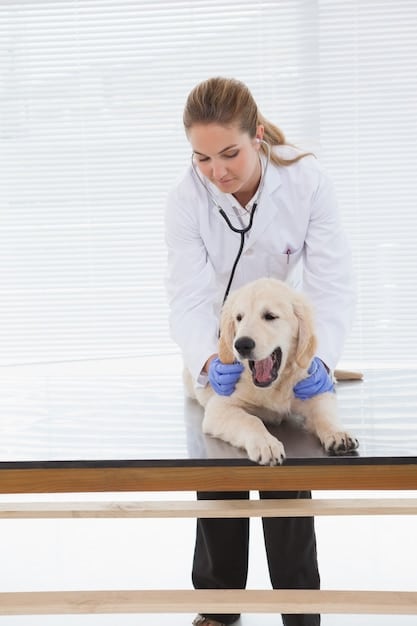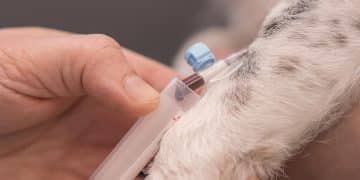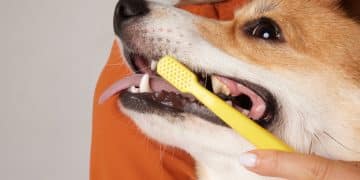The Importance of Regular Vet Visits: Saving Money and Keeping Pets Healthy

Anúncios
Regular veterinary checkups are crucial for early detection of health issues in pets, potentially saving significant money and improving their quality of life through preventative care and timely intervention.
The Importance of Regular Veterinary Checkups: Catching Health Problems Early Can Save You Thousands. Many pet owners view vet visits as necessary evils, reserved for emergencies or vaccinations. However, consistent check-ups are vital for detecting subtle health changes that can signal the onset of serious conditions.
Anúncios
Why Regular Vet Checkups Are Essential for Pet Health
Regular veterinary checkups are not merely about administering vaccines; they represent a holistic approach to pet healthcare. These routine visits provide an opportunity for veterinarians to assess your pet’s overall health, detect early signs of illness, and offer preventative care advice tailored to your pet’s specific needs.
Think of it as preventive medicine for your furry friend. Just as humans benefit from regular physical exams to catch potential health problems early, so do our pets.
Anúncios
Early Disease Detection
One of the most significant benefits of regular vet checkups is the early detection of diseases. Many serious conditions, such as kidney disease, heart problems, and cancer, often have subtle initial symptoms that can easily be missed by owners. Vets are trained to identify these early warning signs through physical examinations and diagnostic tests.
Personalized Preventative Care
Every pet is unique, and a one-size-fits-all approach to healthcare simply doesn’t work. Regular vet checkups allow for personalized preventive care plans, including tailored vaccination schedules, parasite prevention strategies, and nutritional recommendations based on your pet’s age, breed, lifestyle, and health history.
- 🐾 Enable early detection of diseases that may not be apparent at home, such as early-stage kidney disease or heart murmurs.
- 🩺 Provide opportunities for veterinarians to administer necessary vaccinations and boosters to protect against common infectious diseases.
- 💪 Allow for personalized healthcare plans tailored to the pet’s specific needs, considering age, breed, lifestyle, and health history.
- 🐛 Include preventative measures against parasites like fleas, ticks, and heartworms, ensuring the pet remains comfortable and healthy.
In conclusion, regular checkups are a key component of responsible pet ownership. Detecting health problems early and providing preventative care leads to healthier, happier pets and significant long-term savings.
What to Expect During a Routine Veterinary Visit
Understanding what happens during a routine veterinary visit can help alleviate anxiety for both you and your pet. A typical checkup involves a comprehensive physical examination, discussion of your pet’s health and lifestyle, vaccinations (if needed), and any necessary diagnostic tests or treatments.
Knowledge is power, and knowing what to expect during vet visits can make the process less stressful for everyone involved.

The Physical Examination
The physical examination is a thorough assessment of your pet’s overall health. The vet will check vital signs such as temperature, heart rate, and respiratory rate. They will also examine your pet’s eyes, ears, nose, mouth, skin, and coat for any abnormalities. Palpation, or feeling, is also used to assess the abdomen for any swelling, masses, or pain.
Discussion of Health and Lifestyle
This is your opportunity to discuss any concerns you have about your pet’s health or behavior. Be prepared to answer questions about your pet’s diet, exercise habits, sleeping patterns, and any changes you’ve noticed. This information is crucial for the vet to gain a complete understanding of your pet’s health.
Regular vet visits involve much more than just a quick examination; they are opportunities to build a strong relationship with your veterinarian and collaboratively manage your pet’s health. Expect a comprehensive physical examination, an open discussion about your pet’s lifestyle and overall condition, and a chance to address any concerns or changes you’ve observed.
- 📝 A thorough physical exam to check vital signs, such as heart rate and temperature, to ensure normal function.
- 👂 Examination of the eyes, ears, and mouth to identify any potential infections, dental issues, or other abnormalities.
- 🐕 Discussion of any observed changes in behavior or appetite, providing insights into potential underlying health issues.
- 💉 Administration of necessary vaccinations and boosters, safeguarding against common and preventable diseases.
Understanding what to expect during a routine vet visit can help keep both you and your pet comfortable. Comprehensive exams and informative discussions all contribute to ensuring the best possible care for your animal.
The Financial Benefits of Preventative Veterinary Care
While the upfront cost of regular vet visits might seem like an expense, it’s an investment that can save you thousands of dollars in the long run. Early detection and prevention of diseases can significantly reduce the need for costly treatments and surgeries. By identifying problems early, veterinarians can often manage conditions with less invasive and more affordable methods.
Consider the potential expenses associated with treating a chronic disease versus the relatively small cost of preventative care – the savings can be substantial.
Lowering the Risk of Emergency Treatments
Pets with chronic, undetected health problems often end up needing emergency veterinary care. Emergency visits and procedures are significantly more expensive than routine care. Regular checkups can help prevent emergencies by catching and managing health issues before they escalate.
Minimizing Long-Term Treatment Costs
Chronic diseases like diabetes, kidney disease, and arthritis require ongoing management and treatment, which can be costly. Early detection through regular vet checkups allows for timely intervention, potentially slowing the progression of the disease and reducing the need for expensive long-term treatments.
Investing in preventative care is not only good for your pet’s health but also wise for your wallet. By identifying and managing potential health issues early, pet owners can significantly reduce the need for costly emergency treatments and long-term care.
- 💰 Regular checkups help in early detection of diseases which can be managed with less invasive and costly treatments.
- 🏥 Preventative care can reduce the likelihood of emergency vet visits, which are typically more expensive than routine appointments.
- 💊 Early intervention in chronic diseases can slow their progression and decrease the need for long-term, costly treatments.
Regular veterinary visits help ensure that pets receive consistent care that avoids emergency situations and costly procedures. Overall pet health and financial wellness are significantly improved.
Tips for Making Vet Visits Less Stressful for Your Pet
Many pets experience anxiety during veterinary visits, which can make it challenging for both the pet and the vet. However, there are several strategies you can use to minimize stress. These may include training and acclimation, familiarizing pets with the carrier, and making the clinic environment more comfortable.
A relaxed pet makes for a more efficient and accurate examination. Let’s explore some ways to keep your furry friend calm.

Creating Positive Associations
Associate the vet or the pet carrier with positivity. Begin by placing treats and toys in the carrier, encouraging your pet to enter voluntarily. Regular short drives in the carrier, ending with a pleasant experience like a walk or playtime, can also help create positive associations. For the vet itself, practice handling your pet similarly to how a vet would. Touch their paws, look in their mouth, etc., so they get used to being handled. Reward calmness with treats.
Using Calming Aids
Consider using calming aids such as pheromone sprays or calming treats before the visit. These products can help reduce anxiety and promote relaxation. Always consult with your veterinarian before using new supplements or medications.
- 🐾 Start acclimating pets to their carriers by placing treats and toys inside, encouraging them to explore the space without pressure.
- 🚗 Take short, relaxed car rides with the pet in the carrier, associating travel with positive experiences, such as a walk in the park.
- 🌿 Use pheromone sprays and calming treats to help reduce anxiety during the trip and while at the clinic, creating a sense of calm.
Reducing stress and anxiety during vet visits is beneficial for pets and owners and can positively impact the veterinary staff. These actions keep everyone safer and healthier, ensuring pets continue to receive quality care.
Understanding the Role of Vaccinations and Preventative Medications
Vaccinations and preventative medications are crucial components of your pet’s healthcare plan. They protect against a variety of infectious diseases and parasites, preventing serious illness and potentially saving your pet’s life. Vaccinations help protect pets from common diseases such as rabies, distemper, and parvovirus. Preventative medications protect against fleas, ticks, and heartworms.
Working with your vet to strategize vaccinations and medications is essential for the continuing health of your beloved pet.
The Importance of Core Vaccinations
Core vaccinations are those recommended for all pets, regardless of their lifestyle or geographic location. These vaccines protect against diseases that are highly contagious, cause severe illness, and can be fatal. Your veterinarian can advise you on the appropriate vaccination schedule for your pet.
Protecting Against Parasites
Parasites such as fleas, ticks, and heartworms can cause a range of health problems in pets, from mild skin irritation to life-threatening conditions. Preventative medications are available to protect your pet from these parasites, and your veterinarian can help you choose the best option based on your pet’s risk factors.
Understanding and incorporating vaccinations and preventative medications into your pet’s routine is an essential step in caring for their health. Regular consultations with a vet ensure the plan is always up-to-date and tailored to fit unique needs.
- 🛡️ Core vaccines protect against highly contagious diseases like rabies, distemper, and parvovirus, which can cause severe illness or death.
- 🦟 Preventative medications guard against parasites such as fleas, ticks, and heartworms, protecting pets from skin irritation and serious health conditions.
- 📅 Following a veterinarian-recommended schedule ensures timely administration of vaccines and medications, providing continuous protection throughout the pet’s life.
A proactive approach to vaccinations and regular preventative medications keeps pets healthier, contributing to their overall quality of life. Ensuring the pet is comfortable and protected will boost happiness and companionship.
Nutrition and Exercise: Key Components of a Healthy Lifestyle
Proper nutrition and regular exercise are fundamental to your pet’s health and well-being. A balanced diet provides the essential nutrients your pet needs to thrive, while regular exercise helps maintain a healthy weight, strengthens muscles and bones, and promotes mental stimulation.
Just like humans, pets benefit enormously from a healthy lifestyle. An active, healthy pet is a happy pet.
Choosing the Right Food
Selecting the right food for your pet can be overwhelming, with so many options available on the market. Consider your pet’s age, breed, activity level, and any specific dietary needs when choosing a food. Look for high-quality ingredients and avoid foods with excessive fillers or artificial additives. When in doubt, consult with your veterinarian for recommendations.
Creating an Exercise Routine
The amount of exercise your pet needs depends on their age, breed, and energy level. Dogs typically benefit from daily walks, runs, or playtime. Cats can be entertained with interactive toys and climbing structures. Regular exercise helps prevent obesity, improves cardiovascular health, and reduces behavioral problems.
Nutrition and exercise are vital for your pet’s physical and mental health. Collaborating with your veterinarian ensures all the pet’s needs are met for a positive life and improved emotional well-being.
- 🦴 Choose high-quality pet food that provides essential nutrients while avoiding excessive fillers and artificial additives, supporting overall health.
- 🏃 Incorporate daily exercise routines tailored to each pet’s needs, whether it’s walks for dogs or interactive play for cats, to maintain a healthy weight and reduce boredom.
- 🩺 Regular veterinary checkups can help monitor the pet’s diet and exercise progress, ensuring they stay on track for optimal health.
Combining the right nutrition and a steady exercise routine is a crucial aspect of responsible pet ownership. Providing love, care, and attention greatly benefits your pet, resulting in a greater bond between the owner and animal.
| Key Point | Brief Description |
|---|---|
| 🐶 Early Detection | Regular checkups help catch diseases early. |
| 💉 Vaccinations | Essential for preventing infectious diseases. |
| 🐛 Parasite Prevention | Protects against fleas, ticks, and heartworms. |
| 💪 Nutrition & Exercise | Key for overall health and well-being. |
Frequently Asked Questions (FAQs)
▼
The frequency of vet visits depends on your pet’s age and health. Puppies and kittens need more frequent visits for vaccinations. Adult pets typically benefit from annual checkups, while senior pets may need visits every six months to monitor age-related health changes.
▼
A typical vet checkup includes a physical examination where the vet checks your pet’s vital signs, examines their eyes, ears, mouth, and skin, and listens to their heart and lungs. They may also discuss your pet’s diet and behavior.
▼
Yes, vaccinations are crucial for protecting your pet from common and potentially fatal diseases. Core vaccines are highly recommended for all pets, while lifestyle vaccines are recommended based on your pet’s risk of exposure to certain diseases.
▼
To reduce stress, try acclimating your pet to their carrier, using calming aids, and creating positive associations with the vet’s office. You can also bring your pet’s favorite toys or treats to the appointment to help them feel more comfortable.
▼
Preventative care, including regular checkups, vaccinations, and parasite prevention, helps detect health issues early, preventing them from becoming more serious and costly to treat. It’s an investment in your pet’s long-term health and well-being.
Conclusion
In conclusion, prioritizing regular vet visits is an investment in your pet’s well-being and can save you money in the long run by detecting and preventing serious health problems. With proactive care and a strong partnership with your veterinarian, you can ensure a happy, healthy life for your beloved companion.






